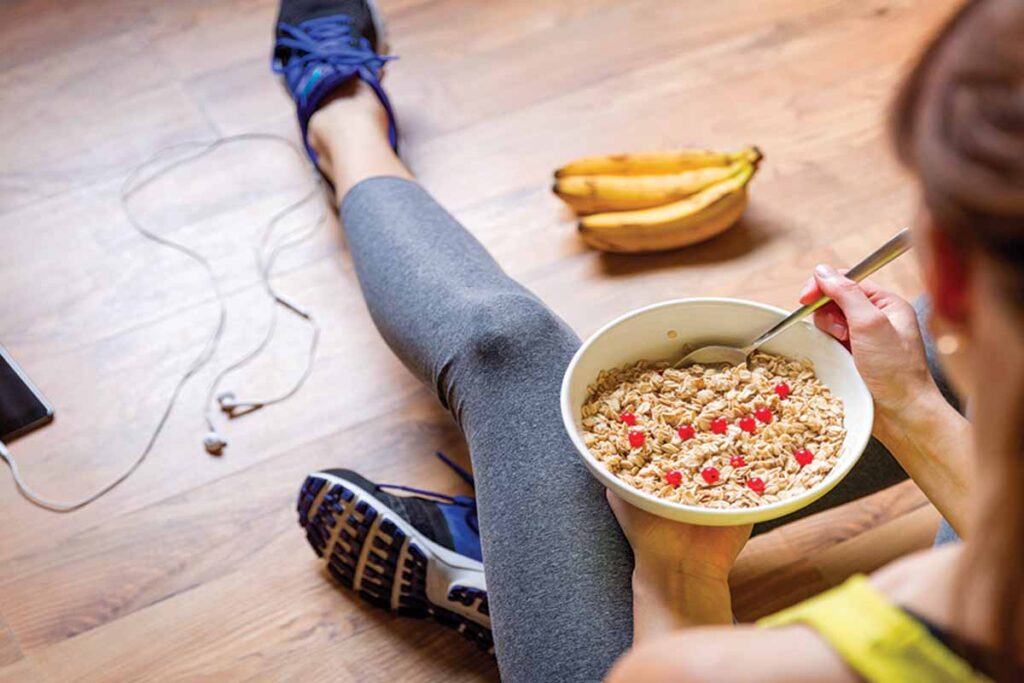Today’s Dietitian
Vol. 24, No. 5, P. 9
Q: I’ve heard that vegan athletes can be at risk of getting too little leucine. What is leucine, and why is it a concern for these athletes?
A: Leucine is an essential amino acid that’s important for overall healthy muscle tissues, as it stimulates protein synthesis and helps reduce muscle breakdown, especially after strenuous workouts.
For athletes who train regularly, leucine is essential to help them build and rebuild muscle. However, leucine isn’t commonly found in plant-based foods, and this can pose an intake issue for vegan athletes. However, RDs can counsel athletes who follow this eating pattern to ensure they get enough leucine.
Leucine in Sports Nutrition
Leucine and fellow amino acids isoleucine and valine are the three branched-chain amino acids that make up about one-third of muscle protein.1 “In the sports nutrition world, it’s said that leucine is the ‘light switch’ to muscle recovery and synthesis after a workout,” says Amy Goodson, MS, RD, CSSD, LD, a sports dietitian and nutrition communications consultant in the Dallas-Fort Worth area. “In other words, it turns on the recovery and muscle repair process.”
As such, “Leucine acts as an anabolic trigger and anabolic mediator to increase the transport of other amino acids into muscle,” explains Leslie Bonci, MPH, RDN, CSSD, LDN, a sports dietitian and owner of Active Eating Advice by Leslie Bonci, LLC, in Pittsburgh. “These amino acids accumulate in the muscle-free amino acid pool and can be used for protein synthesis.” Research shows that following exercise, there are significant decreases in serum levels of leucine—decreases of 11% to 33% after aerobic exercise, 5% to 8% after anaerobic exercise, and 30% following strength exercise.1
The bottom line: For athletes who train regularly, leucine is essential to help build and rebuild muscle.
Incorporating Foods High in Leucine
If an athlete’s meal plan is adequate in leucine, they’ll experience muscle protein synthesis (anabolism), while a meal plan deficient in leucine will block muscle protein synthesis, resulting in muscle catabolism, Bonci says. Without adequate leucine intake, an athlete also may experience slowed or decreased recovery after training.
Athletes should be eating sources of high-quality protein at each meal and snack throughout the day to ensure they’re getting adequate essential amino acids to build and rebuild muscle; however, consuming leucine in the immediate minutes following exercise should be prioritized for optimal muscle resynthesis, Goodson says. “Ideally, we want athletes to consume 10 g of essential amino acids within two hours after training; this equates to approximately 15 to 25 g total, or 0.25 to 0.3 g protein/kg of body weight. Of this, ideally we want 2.5 g of [that 15 to 25 g total protein intake] to be leucine,” she says.
According to Bonci, the following foods are among the highest in leucine2:
• 1% cottage cheese (1 cup): 163 kcal, 28 g protein, 2.9 g leucine;
• skinless chicken breast (about 4 oz): 188 kcal, 36 g protein, 2.7 g leucine;
• one serving of whey protein isolate (27 g): 100 kcal, 23 g protein, 2.5 g leucine;
• canned tuna (3 oz): 109 kcal, 28 g protein, 1.6 g leucine;
• black beans (1 cup): 218 kcal, 15 g protein, 1.2 g leucine;
• firm tofu (1/2 cup): 98 kcal, 11 g protein, 1 g leucine;
• peanut butter (2 T): 191 kcal, 7 g protein, 0.5 g leucine; and
• cooked oatmeal (1 cup): 166 kcal, 6 g protein, 0.5 g leucine.
The list of foods Bonci provides demonstrates that high-quality animal proteins are significant sources of leucine. Because dairy foods can contain considerable leucine, it’s easier for lacto- or lacto-ovo-vegetarians (vegetarians who include dairy, or dairy and eggs, respectively, in their diets) to get leucine. According to a joint position paper from the Academy of Nutrition and Dietetics, American College of Sports Medicine, and Dietitians of Canada, dairy foods, especially fluid sources of dairy such as milk, appear to be superior to other tested proteins due to their leucine content and the digestive and absorptive kinetics of branched-chain amino acids.3 As demonstrated, it’s more challenging for vegan athletes to get enough leucine, as it’s not as prevalent in plant-based proteins.
Recommendations for Clients
When counseling vegan athletes, it’simportant to educate them on leucine-containingplant-based foods and how they may incorporate those foods intotheir eating pattern. For example, Goodsonexplains, “in a postworkout scenario,[incorporating these foods] might look like a plant-based protein powderthat contains the recommended 2.5 g ofleucine. But at other meals, consumingfoods like firm tofu; navy beans; seeds likepumpkin, sesame, and hemp; peanuts;lentils; spirulina; and even oats can helpvegan athletes get in leucine from plant-basedfoods. The key is incorporatingthese foods on a regular basis.”
Bonci recommends clients consider a plant protein isolate to help augment leucine intake. Usually sold in powdered form, clients can add these isolates to soups, dips, stews, smoothies, and more. Dietetics professionals should guide clients toward high-quality isolates, ensuring they provide the quantity of leucine the athlete needs.
— Toby Amidor, MS, RD, CDN, FAND, is the founder of Toby Amidor Nutrition (tobyamidornutrition.com) and a Wall Street Journal bestselling author. She’s written several cookbooks, including The Best Rotisserie Chicken Cookbook and The Family Immunity Cookbook: 101 Easy Recipes to Boost Health. She’s also a nutrition expert for FoodNetwork.com and a contributor to U.S. News Eat + Run and other national outlets.
References
1. Mero A. Leucine supplementation and intensive training. Sports Med. 1999;27(6):347-358.
2. FoodData Central. U.S. Department of Agriculture, Agricultural Research Service website. https://fdc.nal.usda.gov/
3. Thomas DT, Erdman KA, Burke LM. American College of Sports Medicine joint position statement. Nutrition and athletic performance. Med Sci Sports Exerc. 2016;48(3):543-568.



